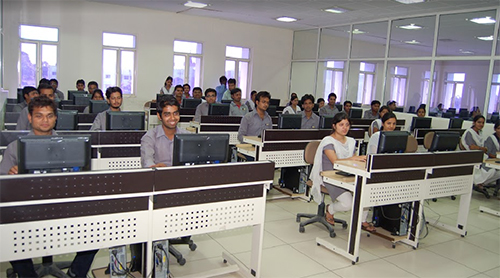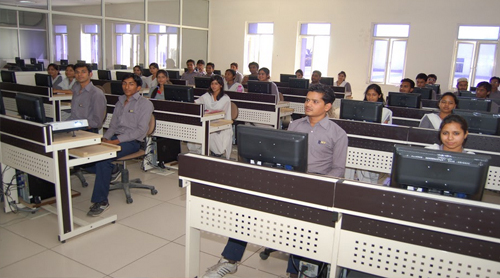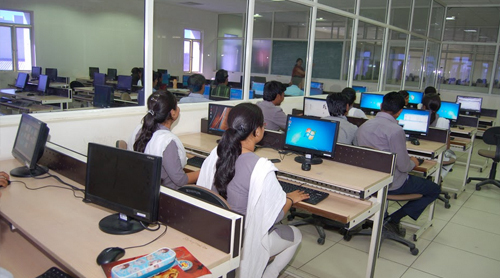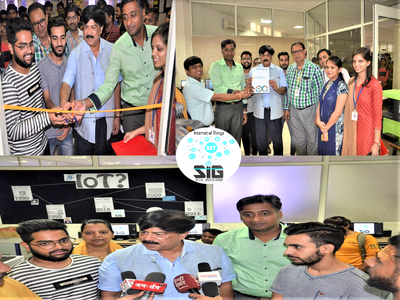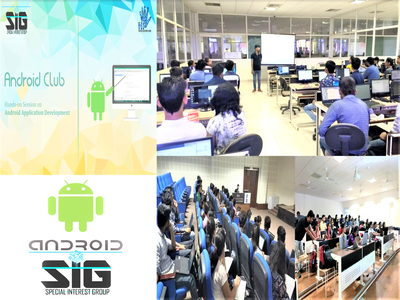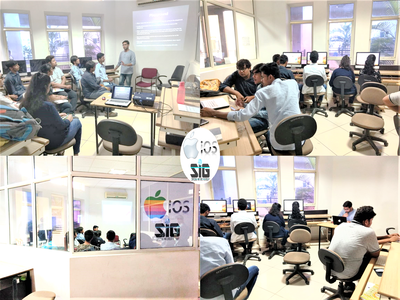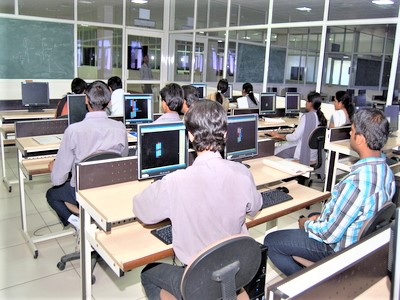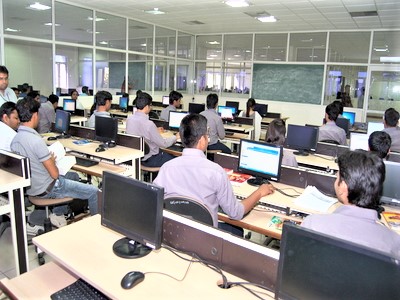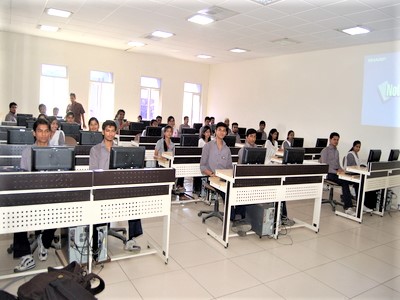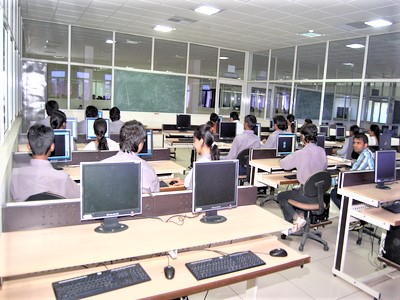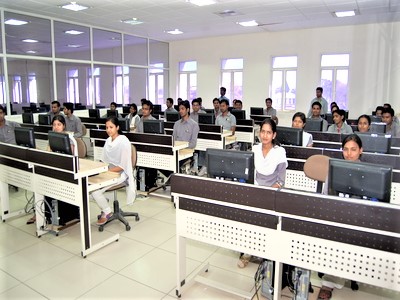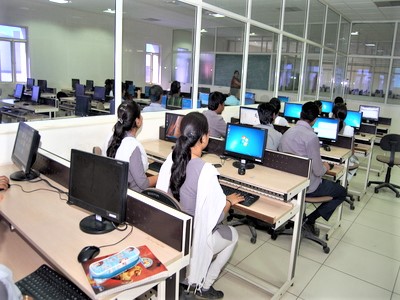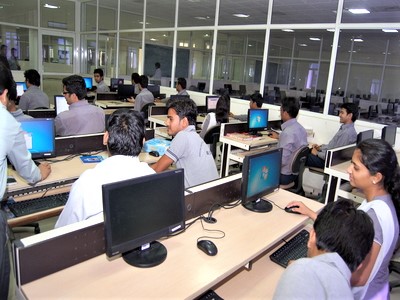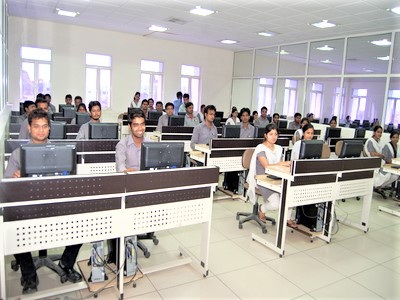 Important Documents For Admission (2025 - 2026)
Important Documents For Admission (2025 - 2026)
| Degree Awarded | Discipline | Duration | Entry Level | Seats in IIST |
| B.Tech | AI & ML | 4 years | 10+2 | 180 |
Indore Institute of Science and Technology (IIST) offers a four-year under-graduate B. Tech course in Artificial Intelligence and Machine Learning which aims to develop a strong foundation by using the principles and technologies that consist of many facets of Artificial Intelligence including logic, knowledge representation, probabilistic models, and machine learning. This course is best suited for students seeking to build world-class expertise in Artificial Intelligence and Machine Learning and emerging technologies which help to stand in the crowd and grow careers in the upcoming technological era.
B. Tech. in Artificial Intelligence is an undergraduate program with advanced learning solutions imparting knowledge of advanced innovations like machine learning, often called deep learning and artificial intelligence.
The course is designed to give the students enough exposure to the variety of applications that can be built using techniques covered under this program. They shall be able to apply AI/ML methods, techniques and tools to the applications. The students shall explore the practical components of developing AI apps and platforms. Proficiency in mathematics will thrive, as this degree requires strong problem-solving and analytical skills. They shall be able to acquire the ability to design intelligent solutions for various business problems in a variety of domains and business applications. The students shall be exploring fields such as neural networks, natural language processing, robotics, deep learning, computer vision, reasoning and problem-solving. The key objective is to identify logic and reasoning methods from a computational perspective, learn about agent, search, probabilistic models, perception and cognition, and machine learning.
This specialization is designed to enable students to build intelligent machines, software, or applications with a cutting-edge combination of machine learning, analytics and visualization technologies. The main goal of artificial intelligence (AI) and machine learning is to program computers to use example data or experience to solve a given problem. Many successful applications based on machine learning exist already, including systems that analyze past sales data to predict customer behavior (financial management), recognize faces or spoken speech, optimize robot behavior so that a task can be completed using minimum resources, and extract knowledge from bioinformatics data.
This program discusses AI methods based in different fields, including neural networks, signal processing, control, and data mining, in order to present a unified treatment of machine learning problems and solutions.
The Program Educational Objectives of the Artificial Intelligence and Machine LearningUndergraduate program are designed to produce knowledgeable Machine Learning engineerswho are ready to contribute effectively to the advancement of Intelligent Computing systems.The graduates shall:
| Univ. Subject Code | Subject Name | CO Description |
| BT-201 | Engineering Physics | The Coursework is designed to provide students the opportunity to learn key concepts of Wave nature of particles and the Schrodinger equation. |
| Student will able to understand the knowledge of Wave optics i.e. interference and diffraction. | ||
| To introduce the idea of solids like semiconductors (P type and N Type semiconductors), Diodes and Hall effect. STudents will also be able to understand the basic concept of superconductivity. | ||
| To develop the understanding of Lasers, fiber optics and their applications in field of engineering sciences. | ||
| To provide you to basic understanding of Electrostatics in vacuum. | ||
| BT-102 | Mathematics-I | To introduce the fallouts of Rolle’s Theorem that is fundamental to application of analysis to Engineering problems. |
| To introduce the idea of applying differential and integral calculus to notions of curvature and to improper integrals. Apart from some applications it gives a basic introduction on Beta and Gamma function | ||
| To develop the tool of power series and Fourier series for learning advanced Engineering Mathematics. | ||
| To familiarize the student with functions of several variables that is essential in most branches of engineering | ||
| To develop the essential tool of matrices and linear algebra in a comprehensive manner. | ||
| BT-203 | Basic Mechanical Engineering | Understand the properties of material, stress strain. Properties of alloys and cast iron. |
| Understand the concept measurement and machine tools their operations and their applications. | ||
| Understand the concept of fluid flow , properties of fluid, Bernoulli’s equation, Pascal’s law. | ||
| To Understand the concept of heat and temperature, law of thermodynamics, boilers and their mountings and accessories, basic Refrigeration cycles and its applications. | ||
| To Understand the working of different cycles and 4 strokes, 2 stroke engines and their applications. | ||
| BT-204 | Basic Civil Engineering & Mechanics | Students will acquire the basic knowledge in different fields of civil engineering and materials used in construction. |
| Gain the ability to use modern survey equipment to measure angles and distances. | ||
| Students will understand the basic of contour lines and map | ||
| Students will have the ability to identify, formulate and solve engineering problems related to Engineering Mechanics: Statics | ||
| Students will be able to analyse beam for shear force and bending moment. | ||
| BT-205 | Basic Computer Engineering | Able to understand the basic applications of computers in various fields, describe operating system, its role and functionalities and to apply concepts of MS word, MS power point, MS Excelefficiently. |
| Discuss and apply simple algorithms for arithmetic and logical problems. | ||
| Translate the algorithms to programs applyingobject-oriented concepts in C++ programming language. | ||
| Understand basics of computer networks, OSI layers and protocols, E commerce applications, impact of securitythreats and attacks on networking systems and also security measures | ||
| Understand the different method for representing and processing data and to get awareness about the impact of cloud computing, its various type of services. | ||
| BT-206 | Language Lab & Seminars | learners to develop good listening skills. |
| Encourages learner to talk freely and lose their shyness when talking in front of the people | ||
| To develop the overall personality of the students by the practical activities | ||
| Helps in confidence building, motivation to be more presentable and help in removing the stage fright | ||
| Develops speaking, writing, reading, listening and presentation skills. | ||
| BT-101 | Engineering Chemistry | Differentiate hard and soft water; solve the related numerical problems on water purification and its significance in industry and daily life. |
| Select the lubricant for various purposes based on the type of Machines. |
||
| Equipped with basic knowledge of polymer , methods of polymerization and various industrial applications of polymers |
||
| Draw the Phase diagrams of one & two component systems and causes, consequences and methods to minimize corrosion to improve industrial designs. | ||
| Identify the structure of unknown/new compounds with the help of spectroscopy and understand periodic properties such as ionization potential, oxidation states and electro negativity | ||
| BT-202 | Mathematics-II | To introduce effective mathematical tools for the solutions of ordinary and partial differential equations that model physical processes. |
| To introduce the tools of differentiation and integration of functions of complex variable those are used in various techniques dealing engineering problems. | ||
| To acquaint the student with mathematical tools available in vector calculus needed various field of science and engineering. | ||
| BT-103 | English for Communication | Effective use of verbal and non-verbal communication for enhanced soft skill beside enhanced reading comprehension as well |
| Write the different kinds of letters, reports and technical writing. | ||
| Apply basic rules of grammar in both written as well as oral communication. | ||
| BT-104 | Basic Electrical & Electronics Engineering | To introduce the concept of Basics of DC electrical Network including network theorems. |
| To introduce the concept of Basics of AC electrical Network(single phase & 3 phase).. | ||
| To study of law of Electromagnetism, introduction of transformer. | ||
| To study of various electrical Machines. | ||
| To study Basic Concept Digital Electronics. | ||
| BT-105 | Engineering Graphics | Draw various types of scales, and curves. |
| Draw orthographic projections of points & lines | ||
| Draw orthographic projections of Planes & Solids | ||
| Draw sections and development of solids including cylinders, cones, prisms and pyramids. | ||
| Draw isometric views of Planes and Solids, Drawing using AUTOCAD. | ||
| BT-106 | Manufacturing Practices | Use hand and power tools for different manufacturing processes |
| Operate machine tools while preparing any component | ||
| Select the appropriate tools required for specific operation. | ||
| Comprehend the safety measures required to be taken while using the tools. | ||
| Prepare Foundry, Fitting, Carpentry, Welding and smithy Job. | ||
| BT-107 | Internship-I (60 Hrs Duration) at the Institute level | Demonstrate the application of knowledge and skill sets acquired from the course and workplace in the assigned job function/s |
| Solve real life challenges in the workplace by analysing work environment and conditions, and selecting appropriate skill sets acquired from the course | ||
| Exhibit critical thinking and problem solving skills by analysing underlying issue/s to challenges | ||
| Demonstrate appreciation and respect for diverse groups of professionals by engaging harmoniously with different company stakeholders | ||
| Exhibit professional ethics by displaying positive disposition during internship | ||
| BT-108 | Swachh Bharat Summer Internship Unnat Bharat Abhiyan (100Hrs)/ Rural Outreach | This course is to sensitize students about the socio-cultural aspects of the rural areas parochial to their colleges. |
| Students are expected to observe, investigate and learn about the following aspects of the rural region: i. Demographics, Literacy, Geographical parameters of the Village; ii. Schemes of government of India and State of Madhya Pradesh in operation in the villages. | ||
| To enhance critical thinking by making them participate in social activities and imbibe human values among them. | ||
| Rural Swachh Bharat Abhiyan is to promote cleanliness and develop healthy habits in people in villages. | ||
| Unnat Bharat Abhiyan: To build an understanding of the development agenda within institutes of Higher Education and an institutional capacity and training relevant to national needs, especially those of rural India. | ||
| AI301 | AI 301 Technical Communication |
Acquisition of technical communication’s generic aspects like Reading Technical Material, Technical Writing, Listening, Thinking and using technical phrases in spoken, Knowing the parts of a technical documents like screenshots, graphs, tabular data, data analysis, pictorial depiction. |
| Getting adapted with the technical generic formats/templates of technical writing of memos, technical report writing, technical presentations, technical proposal writing, minutes of meeting and the notes taking techniques. | ||
| Accessing the reading material and developing the writing technical material with the use of technical concepts and tools like Vacaroo, Miscrosoft Visio, Notepad ++, Kinemaster, Powtoon, Split Page Technique, Diagram Technique. | ||
| Learning the skill of proofreading and copy editing, paraphrasing and spinning using technical tools and manually using the knowledge of advance technical grammar. | ||
| Learning the technical phrases and writing styles like descriptive, argumentative etc for developing good technical documents for presentations or disseminating technical documents. | ||
| AI 302 | AI 302 (Probability and Statistics) | Upon completion of the course, the student will be able to: Apply the basic counting techniques (multiplication rule, combinations, permutations) to compute probability and work with discrete random variables and demonstrate understanding what expectation, variance, covariance and correlation mean and be able to compute and interpret them. |
| Understand the properties and applications of some standard bivariate and continuous probability distributions for both discrete and continuous random variables. | ||
| Explain the concept of order statistics and solving problems related to it also will be using Binomial, Poisson, and Normal distributions to solve statistical problems. | ||
| Use scatter plots to visualize the relationship between two variables and apply the least square errors method numerically and algebraically to find the curve of best fit also will be having Knowledge about formulating and testing a hypothesis, using critical values to draw conclusions and determining probability of making errors in hypothesis tests. | ||
| Get an idea of order statistics with its applications. Also about small sample tests based on Chi-square, t and F distributions to understand and analyze various methods of Non-parametric tests | ||
| AI 303 | AI 303 Data Structure |
To understand the concept of linear, non-linear data structures, the operations performed on them and the applications of various data structures. |
| Understand the arrays, searching and sorting algorithms. | ||
| Implement stacks, queues and its applications. | ||
| Implement linked list and its variations. | ||
| Solve problem involving graphs, trees and heaps. | ||
| AI 304 | AI 304 AI |
Demonstrate fundamental understanding of the history of artificial intelligence (AI) and its foundations |
| Apply basic principles of AI in solutions that require problem solving, inference, perception, knowledge representation, and learning | ||
| Demonstrate an ability to share in discussions of AI, its current scope and limitations, and societal implications of applications like NLP | ||
| Demonstrate profciency in applying method for forward and backward reasoning. | ||
| Demonstrate awareness and a fundamental understanding of various applications of AI techniques in intelligent agents, expert systems, artificial neural networks and other machine learning models | ||
| AI 305 | AI 305 OOPM |
Describe the procedural and object oriented paradigm with concepts of streams, classes, functions, data and objects. |
| Understand dynamic memory management techniques using pointers, constructors, destructors etc. | ||
| Describe the concept of function overloading, operator overloading, virtual functions and polymorphism. | ||
| Understand how to apply the major object-oriented concepts to implement object oriented programs in C++, encapsulation, inheritance and polymorphism. | ||
| Classify inheritance with the understanding of early and late binding, usage of exception handling, generic programming. |
To achieve excellent standards of quality-education by using the latest tools, nurturingcollaborative culture and disseminating customer oriented innovations to relevant areas of academia and industry towards serving the greater cause of society.
| Semester | SIG’s on | Description | Outcome (Certificate/ Project etc) |
|---|---|---|---|
| I Sem | Logic Building & Basic Programming using C language | Able to Solve Programming Problems easy to average level | Preparation for earning Certificate |
| II Sem | Programming Basics using C/C++ Language | Able to Solve Programming Problems average to hard level | Earn Certificate |
| III Sem | Data Structures ALGOLUTION: Foundation of Data Structures and Algorithms | Able to Understand and Apply Data Structure Concept | Preparation for competitive Programming |
| PYTHON | OOP Concept helpful for Placements and implementation of branch specific utility | Earn Certificate | |
| IV Sem | Data Structures Algolution – Algorithmic Pinnacle – Navigating Complexity: | Able to Understand and Apply Data Structure Concept | Preparation for competitive Programming |
| Core JAVA | Able to Work with Framework | Earn Certificate | |
| V Sem | Algorithm Design Algolution – Evolution of Coding through Algorithms | Algorithm design & Application of DS | CODE VITA |
| PYTHON + Machine Learning Project | End to end machine learning project development | Project | |
| VI Sem | Advanced Databases | Database Handling (Short Term SIG) | Project |
| Competitive Coding | Algorithm design & Application of DS | CODE VITA | |
| NLP | Specialization/certification (Short Term SIG) | Project | |
| VII Sem | Skill up Crash Course for Placements | Brushing up all the important subjects for Placements including Apti | Placement Preparation Specific and General |
| Spring, Hibernate MEAN or MERN Stack, MOOC Course : EDX, COURSERA, NPTEL | Sharping and Specialization in at least one domain | Placement Preparation Specific and General | |
| VIII Sem | Skill up Crash Course for Placements | Brushing up all the important subjects for Placements including Apti | Placement Preparation Specific and General |
| MOOC Courses | Sharping and Specialization in at least one domain | Earn Placement and certification |
| Semester | SIG’s on | Description | Outcome (Certificate/ Project etc) |
| I Sem | Logic Building & Basic Programming using C language | Able to Solve Programming Problems easy to average level | Preparation for earning Certificate |
| II Sem | Programming Basics using C/C++ Language | Able to Solve Programming Problems average to hard level | Earn Certificate |
| III Sem | Data Structures ALGOLUTION: Foundation of Data Structures and Algorithms | Able to Understand and Apply Data Structure Concept | Preparation for competitive Programming |
| PYTHON | OOP Concept helpful for Placements and implementation of branch specific utility | Earn Certificate | |
| IV Sem | Data Structures Algolution – Algorithmic Pinnacle – Navigating Complexity: | Able to Understand and Apply Data Structure Concept | Preparation for competitive Programming |
| Core JAVA | Able to Work with Frame Work | Earn Certificate | |
| V Sem | Algorithm Design Algolution – Evolution of Coding through Algorithms | Algorithm design & Application of DS | CODE VITA |
| PYTHON + Machine Learning Project | End to end machine learning project development | Project | |
| VI Sem | SQL | Database Handling (Short Term SIG) | Project |
| Competitive Coding | Algorithm design & Application of DS | CODE VITA | |
| ML-2 | Specialization/certification (Short Term SIG) | Project | |
| VII Sem | Skill up Crash Course for Placements | Brushing up all the important subjects for Placements including Apti | Placement Preparation Specific and General |
| Spring, Hibernate MEAN or MERN Stack, MOOC Course : EDX, COURSERA, NPTEL | Sharping and Specialization in at least one domain | Placement Preparation Specific and General | |
| VIII Sem | Skill up Crash Course for Placements | Brushing up all the important subjects for Placements including Apti | Placement Preparation Specific and General |
| MOOC Courses | Sharping and Specialization in at least one domain | Earn Placement and certification |
| SIG 2022- 2023 | ||||||
| S. No. | Title | SIG / Club / Students Chapter / ETC | Type | Date | Output / Outcome | Impact / Goal |
| 1 | Logic Building & Basic Programming using C language | Programming SIG | Workshop cum Training | Beginning of II Semester | Prepration for earning Certificate | Helpful for clearing Campus Technical MCQ’s |
| 2 | Programming Basics using C/C++ Language | Programming SIG | Workshop cum Training | During II Semester | Earn Certificate | Will learn to understand Problem Statement & Solving approach will be helpful in Solving Campus Technical coding & MCQ’s o |
| 3 | Object Oriented Concept using JAVA | Programming SIG | Workshop cum Training | During III Semester | Earn Certificate | OOP Concept helpful for Placements and inplementation of Data Structure |
| 4 | Data Structures ALGOLUTION: Foundation of Data Structures and Algorithms | Algorithm SIG | Workshop cum Training | During III Semester | Prepration for competetive Programming | Data Structure Concept for Placements and Competetive Programing |
| 5 | PYTHON | Programming SIG | Workshop cum Training | During III Semester | Earn Certificate | OOP Concept helpful for Placements and inplementation of branch specific utility |
| 6 | Advance JAVA | Programming SIG | Workshop cum Training | During IV Semester | Mini Project using UI | Enhances Resume |
| 7 | Core JAVA | Programming SIG | Workshop cum Training | During IV Semester | Earn Certificate | OOP Concept helpful for Placements and inplementation of Data Structure |
| 8 | Data Structures Algolution – Algorithmic Pinnacle – Navigating Complexity: | Algorithm SIG | Workshop cum Training | During IV Semester | Prepration for competetive Programming | Data Structure Concept for Placements and Competetive Programing |
| 9 | Algorithm Design Algolution – Evolution of Coding through Algorithms | Algorithm SIG | Workshop cum Training | During V Semester | CODE VITA | Competetive Programming |
| 10 | JAVA FULL STACK with web development + project (Including HTML, CSS, XML and SQL) | Software Development SIG | Workshop | During V Semester | Project | Successful Project |
| 11 | PYTHON + Machine Learning Project | Machine learning SIG | Internship cum Training | During V Semester | Project | Successful Project |
| 12 | AWS (CCP) | Cloud SIG | Certification course | Beginning of VI Semester | CCP CERTIFICATION | Industry Demand, these skills make student industry ready |
| 13 | CISCO | Networking SIG | Certification course | Beginning of VI Semester | CCNA CERTIFICATION | |
| 14 | ML-2 | Machine learning SIG | Workshop cum Training | Beginning of VI Semester | Project | |
| 15 | SQL | Data base SIG | Training cum internship | Beginning of VI Semester | Project | Getting an overview of flow for developing any project |
| 16 | Competitive Coding | Coding SIG | Workshop cum Training | During VI Semester | CODE VITA | Competetive Programming |
| 17 | Skill up Crash Course for Placements | Placement preparation | Training | During VII / VIII Semester | Placement Prepration Specific and General | Earn Placement |
| 18 | Spring, Hibernate MEAN or MERN Stack, MOOC Course : EDX, COURSERA, NPTEL | Placement preparation | Training | During VII / VIII Semester | Placement Prepration in specific domain | Earn Placement |
| 19 | Skill up Crash Course for Placements | Placement preparation | Training | During VII / VIII Semester | Placement Prepration Specific and General | Earn Placement |
| 20 | MOOC Course | Placement preparation | Certification course | During VII / VIII Semester | Placement Prepration Specific and General | Earn Placement |
Artificial Intelligence presents a solid foundation in the principles and technologies that underlie many facets of AI, including logic, knowledge representation, probabilistic models, and machine learning. It teaches you to
Artificial Intelligence & Machine Learning is an emerging field which grows and changes very frequently. Fields like Machine Learning, Artificial Intelligence, Data Science, Internet of Things, Cloud Computing, Cyber Security etc. are growing exponentially. With this exponential growth in the recent years, there has been a steadily increasing demand for bright graduates to come in and help to transform areas ranging from data infrastructure to cyber security.
Self-learning is motivated in these special interest groups of the department. Various resources related to student interest are provided in the SIG labs. This learning is mentor by faculties and senior students to provide them an opportunity to work in team.
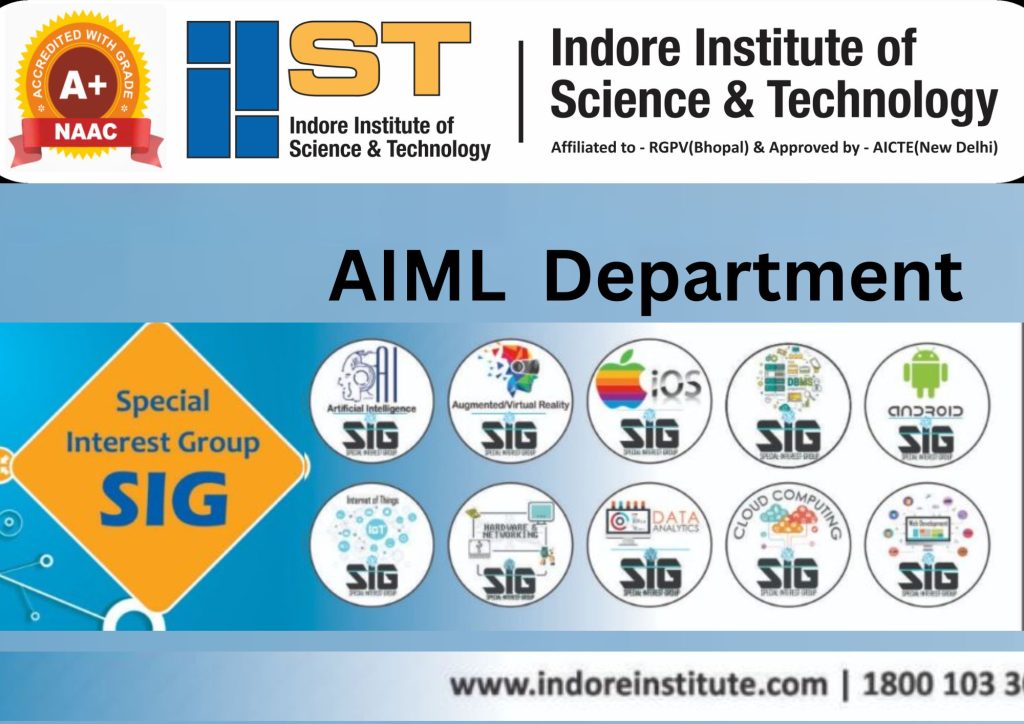
We provide certified skill courses on latest research areas and technologies through our special interest groups (SIG’s)
1. SIG- Artificial Intelligence: The overall purpose of artificial intelligence SIG is to apply different algorithms on raw data so as to allow computers and machines to function in an intelligent manner efficiently. And to evaluate and analyse the patterns of the data. Under this SIG, Students will get chance to implement these algorithm and create artificially intelligence systems.
2. SIG- Augmented and Virtual Reality: The purpose of VR/AR SIG is to understand artificial environment that is created with software for user perception and also to understand how AR works with real world image with extra layers of digital information and to gain better understanding of its wide range of applications.
3. SIG- iOS: Purpose of iOS SIG is to make students develop iOS Applications. With the amount of iPhones in the market, the need for iOS Apps also increases therefore this is the right platform for Students who want to build their career in Mobile app development as individual with their Creative ideas.
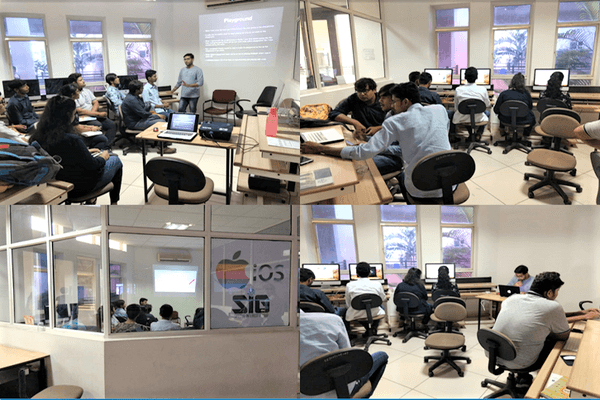
4. SIG- Database Management System: The purpose of DBMS SIG is to learn and practice software tools that organizes data that is to create, retrieve, update and manage data, in systematic way. Under this SIG trainings will be provided on software technologies like SQL, MySQL, Oracle Databases, NoSQL, MongoDB etc.
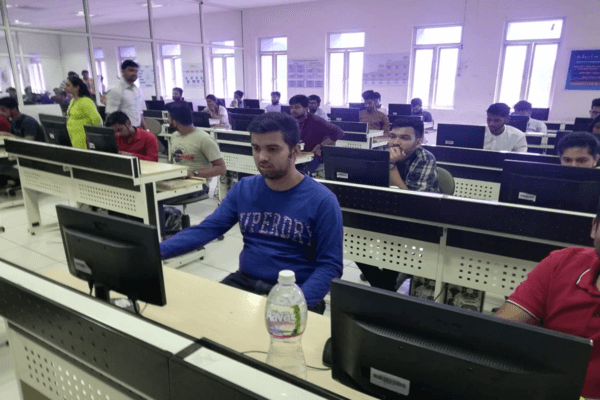
5. SIG- Android: Purpose of Android SIG is to make students understand Android App Development. In this SIG, students will learn the fundamentals of Kotlin, Google’s preferred programming language for Android and build interesting applications. Under this SIG training will be provided which will cover the Android components, tools and technologies like multi-screen Navigation, Android Studio, Intents, Fragments, Widgets, Layout and Ionic to build modern applications.
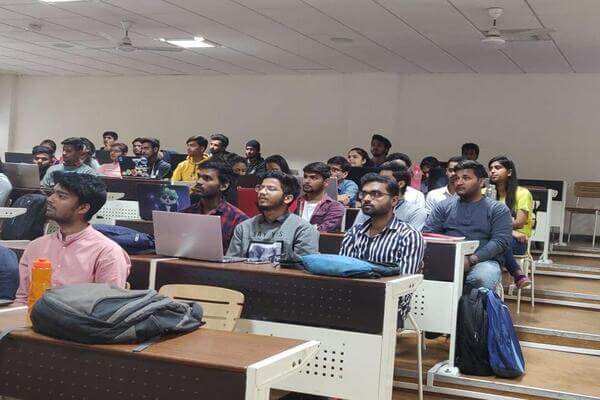
6. SIG- Internet of Things: The purpose is to train students for industry-level projects on IoT by: Organizing workshops/seminars/training/weekend activities for the students. IoT SIG facilitates with all the required equipments for practicising on different modules. These SIG Modules will help students to solve real-world problems and will encourage them to participate in various competitions across the country.
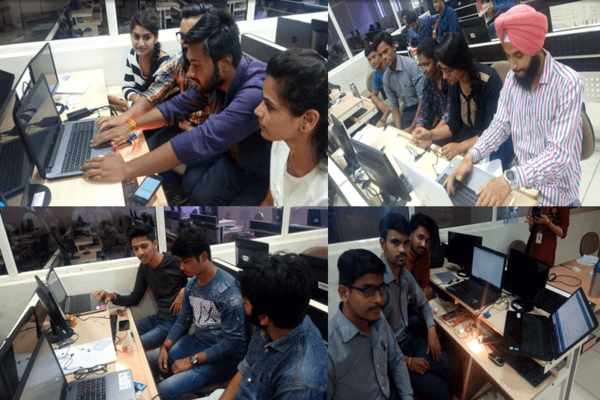
7. SIG- Hardware and Networking: Primary objective of this SIG is to build networking skill and creating a bridge to employment opportunities. Here the students are trained for international certifications like Microsoft, Cisco and Red Hat certifications. Students will learn hardware and operating systems for computer networks and train to upgrade troubleshoot and administer the system which will help them prepare for high-paying jobs. PC hardware/software installation, Networking technologies & concepts, Network administration, Cabling, Cisco router and switch configurations are the key skills focused in this SIG.
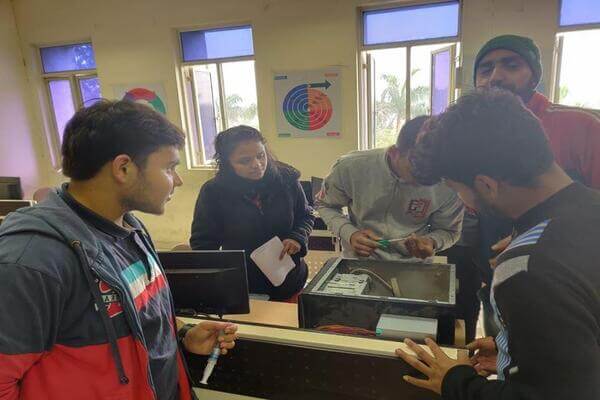
8. SIG- Data Analytics: The major purpose of Data Analytics SIG is to extract useful information from data and taking the decision based upon the data analysis or in simple words to create best out of waste. Here the students are trained to analyse different-different type of dataset and though that understand the pattern of informations that can be derived through that data. Hadoop, R and Python are some technologies which can be used to implement analytics.
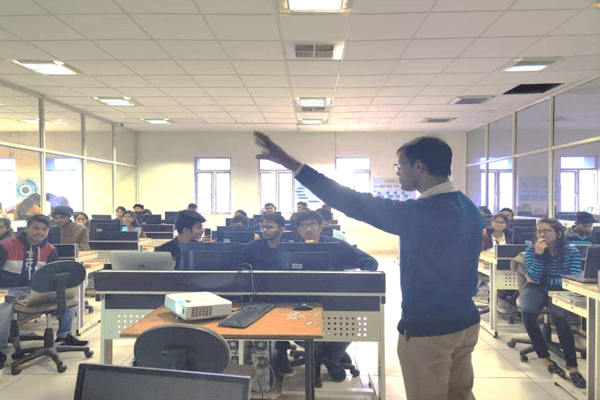
9. SIG- Cloud Computing: Cloud Computing curriculum prepare the students to pursue industry recognized certifications (AWS), and in-demand cloud jobs. In CC SIG, we train students by organizing workshops/seminars/internship. This helps learners explore cloud concepts, use cloud services, handling of security issues, and understand the architecture etc.
10. SIG- Web Development: Web development can range from developing a simple single static page of plain text to complex web-based internet applications (web apps), electronic businesses, and social network services. Web Development SIG gives an opportunity to the students to enhance their skill for web development platform.
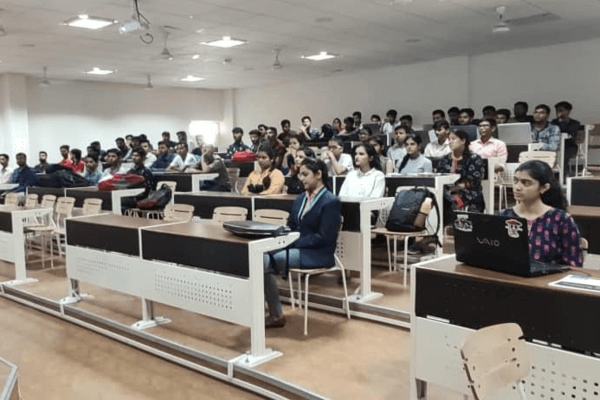
Department of CSE , IT & AIML is proud to be associated with Developer Student Clubs (DSC) with the selection of DSC lead from IIST. The DSC will conduct in-house training activities for the students to enable them to develop solutions for the local businesses.
IIST is proud to announce that we have been accepted into the AWS Academy program with Amazon Internet Services Private Limited (“AISPL”) and we are now authorized to administer and deliver the AWS Academy Cloud Computing Architecture curriculum.
Institute Instead Of Department Of CSE has signed an MoU with RedHat Academy to conduct in-house training on Core System Administration, Middleware Development, Cloud Computing along with Internships in live projects & certification.
AIML department organized Online Session on “Value Proposition Fit” & “Business Fit” for CSE and allied branch students. The Training has been taken by Dr. Satya Vardhan Tiwari. He motivated students to believe in their own potential to reach their destination. This lecture was very beneficial for students looking towards the industry point of view and to make decision about their career prospect in marketing and startups.
An Expert Lecture on Entrepreneurship was organized on World Entrepreneurship Day. Resource person for the same was Mr. Sameer Sharma. In his address; he delves into the key principles and practices essential for aspiring entrepreneurs. He emphasizes the importance of innovation, resilience, and adaptability in the dynamic landscape of business. Expert highlights the significance of identifying market opportunities, creating value for customers, and building a strong brand presence. Throughout the lecture, he shared insights from his own entrepreneurial journey, illustrating the challenges and triumphs he encountered along the way. Moreover, he emphasizes the significance of effective communication and networking skills in building meaningful relationships with stakeholders, investors, and customers.
A training on Comprehensive Data Analysis & ML with Python was organized for AIML students. The resource person for the same was Mr. Shivang Trivedi. This training provided a comprehensive understanding of the powerful data analysis and manipulation capabilities of the Pandas library in Python, as well as the fundamental concepts and techniques of linear regression, one of the most widely used machine learning models. Students also learned how to use the Pandas library to prepare, clean, and analyze data, as well as how to use machine learning models such as linear regression to make predictions and interpret data insights. This Training was very beneficial for students looking towards the industry point of view and to make decision about their career prospect in AI product development.
Artificial Intelligence & Machine Learning department organized Expert Lecture on “Entrepreneurship & Innovation” on occasion of Engineer’s day. The expert for the same was Dr. Rishi Dubey. During his address the expert focused on what is Entrepreneurship & Innovation, why it is important. During his address expert highlighted on the fact that Innovation is often the key to success in entrepreneurship.
Training on “ALGOLUTION: Evolution of coding through Algorithm” for 45 hours was conducted for second year students. The trainer for the same was Mr. Ankush Saklecha. He gave training on ‘Evolution of coding through Algorithm using C language’ from scratch and he explained various concepts related with Data Structure and Algorithm. The main purpose of this training was to enable students to get detailed insights of logical problems of DSA with hands-on.
An expert session on Cyber Security Awareness was organized for the students of second year. Speaker for the session was Mr. Rajesh Dandotiya, Additional Deputy Commissioner of Police Crime Branch, Indore. Session was taken in a way to help participants learn the basics of cyber security. During the session, Mr. Dhandotiya guided students through a different real case which was encountered in different parts of India. Main objective to organize this session was to make students aware about various types of cyber attacks and to guide them to be take preventive measures so that students do not get trapped in any type of cyber crime.
Expert lecture was organized for the students of III year on “How to Crack Google”. Resource person for the same was Mr. Mahendra Chouhan (Software Engineer and Full Stack Developer, Google). The session aimed to equip participants with essential strategies, skills, and insights necessary to pursue career opportunities at Google, one of the world’s leading technology companies. The primary objectives of the session were to provide an overview of Google’s company culture, values, and expectations from candidates; to offer insights into the recruitment process at Google, including resume preparation, interview techniques, and assessment criteria; to equip participants with technical and non-technical skills required to succeed in Google’s competitive hiring environment; to share tips and strategies from successful Google employees and industry experts. By the end of the session, participants gained a clear understanding of Google’s recruitment process and what it takes to stand out as a candidate.
FDP
FDP on research methodology was organized for faculties of IIST. Resource person for the same were Mr. Rakesh Soni, Dr. Shweta Agrwal, Dr. Richa Gupta, Dr. Puneet Duggal, Dr. Veena Dadhwani. The FDP aimed to equip participants with essential skills, knowledge, and techniques required to conduct high-quality research across various disciplines. The primary objectives of the FDP were to familiarize participants with the fundamentals of research methodology and its significance in academic and professional contexts; to provide an overview of different research paradigms, methods, and approaches; to enhance participant’s understanding of research design, sampling techniques, data collection methods, and analysis procedures; to discuss ethical considerations in research and principles of academic integrity and to empower participants to apply research methodology effectively in their respective fields of expertise.
The Pre Kavach Hackathon of IIST was conducted on 1 April 2023. On 27 March a brief about the Pre Kavach Hackathon was given. Briefing was given in offline mode and Pre Kavach was online. There were idea presentations from 28 teams. The idea-cum-team selection was conducted by a panel of 3 Judges during the Internal Hackathon and the judgment was solely based on the Ideas [that were presented by prospective team in prescribed format. It was suggested that student teams should invest sufficient time in conceptualization of the solution to the stated problem statements and create the idea document for submission. Team registrations started from 24 March to 31 March 2023. Evaluation parameters were Relevance of Problem and Solution, Feasibility of Solution and Sustainability. Total 28 Teams participated.
Training titled “PY-Tech:AIML and IoT” was organized for the students of AIML and IoT. Resource person for the same was Mr. Shivang Trivedi. He gave training on ‘Python programming’ from scratch and explained various concepts related with fundamentals of python programming. This comprehensive training program was designed to equip participants with essential skills and knowledge in Python, covering both fundamental concepts and advanced topics crucial for proficiency in this versatile programming language.
Upon completion of the training, participants demonstrated proficiency in writing Python programs from scratch, applying Python for data manipulation and analysis, implementing OOP principles effectively in Python projects, utilizing advanced Python features to enhance code efficiency and readability, solving complex problems using Python’s diverse libraries and tools. Participants are now well-prepared to apply Python effectively in their professional endeavours, leveraging its capabilities to solve real-world problems and contribute meaningfully to their organizations.
An expert lecture on Urban Infrastructure and Vision was organized for students of II-year IoT, AIML and Civil Engineering. Resource person for the same was Mr. P.K Saini (Chief Ex. Engineer, Gwalior Smart City Project ). The main aim of the expert talk was to make the participants aware about the development and government plan about the urban infrastructure and vision.
In the talk Mr. Pawan spoke about the structure plan for the development of smart city. In his talk he also focused on the technology which is imbibed with a smart plan for the development of the city. He spoke and showed the video and prototypes of the deployment of the civil work and the computer devices installation for consideration of smart city development. At last, he showed about the development of the future and effort for the upcoming area and city where the government would be focused effectively.
Workshop on Problem Solving and Ideation was organized for students of AIML and IoT. Experts for the same were Dr. Shweta Agrawal, Mr. Shivang Trivedi and Mr. Ganesh Patidar. The aim of the workshop was to enhance participants’ problem-solving skills and foster creative thinking in the context of emerging technologies.
During the workshop, experienced instructors guided students through a comprehensive introduction to Python, including the syntax, data structures, and built-in functions of the language. This workshop equipped participants with essential skills and fostering a collaborative learning environment. Feedback from attendees was overwhelmingly positive, highlighting the practical relevance and applicability of the workshop content to their academic and professional pursuits in AIML and IoT
Computers are used in almost every aspect of life: automobile engines, microwave ovens, video games, watches, telephones, laptop computers, medical diagnostic equipment, commercial aircraft, and orbital satellites that deliver cable signals around the world. Computers have become tools that perform the immediate, but that’s not even quick enough. So, while the computer field is one of the fastest growing segments of industry today, it is also one of the fastest changing areas technologically.
Graduates with degrees in computer science or computer engineering might find themselves in a variety of environments – academia, research, industry, government, and private or not-for-profit organizations. On a daily basis, computer professionals are called on to analyze challenges, formulate and test solutions, use advanced communications or multimedia equipment, or work in teams for product development. The opportunities are enormous. However, an education in computer science and engineering does not stop with a college degree. It continues on the job or in the graduate school environment through seminars, conferences, advanced courses, and training.
There are a number of career opportunities available in Computer Science and Engineering sector. These opportunities are increasing exponentially day by day. Following are a few areas where CS aspirants can build their career –
| S.no. | Faculty Name | Paper Publication |
| Academic Year 21-22 | ||
| 1 | DR. RAJKUMAR JAIN | REGION BASED NODE ORGANIZATION WITH ENERGY EFFICIENT-MECHANISM-FOR-ON- DEMAND-ROUTING-PROTOCOL-IN-MOBILE AD-HOC NETWORK IN DOGO RANGSANG RESEARCH JOURNAL |
| 2 | DR. SATHISH KUMAR PENCHALA | STUDY ON NETWORK MODEL AND TRANSMISSION OF INFECTIOUS DISEASES IN HOSPITALS IN IJBPAS |
| 3 | DR. SATHISH KUMAR PENCHALA | SMART CITIES AND EMBEDDED IOT SENSOR SYSTEMS TO IMPROVE THE PERFORMANCE OF THE AUTOMATED ENVIRONMENT IN IJBPAS |
| 4 | DR. DHEERAJ RANE | STUDY ON NETWORK MODEL AND TRANSMISSION OF INFECTIOUS DISEASES IN HOSPITALS IN IJBPAS |
| 5 | DR. DHEERAJ RANE | SMART CITIES AND EMBEDDED IOT SENSOR SYSTEMS TO IMPROVE THE PERFORMANCE OF THE AUTOMATED ENVIRONMENT IN IJBPAS |
| 6 | MS. MARGI PATEL | GEDSET: AUTOMATIC DATASET BUILDER FOR MACHINE TRANSLATION SYSTEM WITH SPECIFIC REFERENCE TO GUJARATI-ENGLISH PRESENTED IN 11TH INTERNATIONAL ADVANCED COMPUTING CONFERENCE HELD ON 18TH & 19TH DECEMBER, 2021 AT UNIVERSITY OF MALTA, MALTA |
| 7 | MS. MARGI PATEL | GUJAGRA: AN ACYCLIC GRAPH TO UNIFY SEMANTIC KNOWLEDGE, ANTONYMS AND GUJARATI-ENGLISH TRANSLATION OF INPUT TEXT PRESENTED IN 4TH INTERNATIONAL CONFERENCE ON MACHINE INTELLIGENCE AND SIGNAL PROCESSING HELD IN MARCH 2022 |
| 8 | MS. MARGI PATEL | DSETGENS: AN AUTOMATED TECHNIQUE FOR BUILDING DATASET FROM SPEECH WITH RESPECT TO GUJARATI-ENGLISH PRESENTED IN 11 IEEE INTERNATIONAL CONFERENCE ON COMMUNICATION SYSTEM AND NETWORK TECHNOLOGIES (CSNT) 2022 HELD IN APRIL 2022 |
| 9 | MS. MARGI PATEL | FUTURE ASPECTS OF ARTIFICIAL INTELLIGENCE IN GIS SCIENCE JOURNAL |
| 10 | MS. ALPANA MEENA | FUTURE ASPECTS OF ARTIFICIAL INTELLIGENCE IN GIS SCIENCE JOURNAL |
| 11 | MR. PRADEEP BANIYA | REGION AND ANGLE BASED NODE ORGANIZATION LOCATION UPDATE IN MOBILE AD-HOC NETWORKS IN DOGO RANGSANG RESEARCH JOURNAL |
| 12 | MR. PRADEEP BANIYA | MULTI-FUNCTION E-SCARECROWKAAG BHAGODA SMART-FARMING AND CROP SAFETY WITH IOT/AI IN DOGO RANGSANG RESEARCH JOURNAL |
| 13 | MR. PRITESH SAKLECHA | PLAN AND DEVELOPMENT OF SMART MIRROR DISPLAYING REAL-TIME SENSOR DATA USING RASPBERRY PI IN JOURNAL OF EDUCATION: RABINDRA BHARATI UNIVERSITY |
| 14 | MS. NEHA TALREJA | PLAN AND DEVELOPMENT OF SMART MIRROR DISPLAYING REAL-TIME SENSOR DATA USING RASPBERRY PI IN JOURNAL OF EDUCATION: RABINDRA BHARATI UNIVERSITY |
| 15 | MR.AMIT GOUD | MULTI-FUNCTION E-SCARECROWKAAG BHAGODA SMART-FARMING AND CROP SAFETY WITH IOT/AI IN DOGO RANGSANG RESEARCH JOURNAL |
| 16 | MS. DIPTI REGE | REGION AND ANGLE BASED NODE ORGANIZATION LOCATION UPDATE IN MOBILE AD-HOC NETWORKS IN DOGO RANGSANG RESEARCH JOURNAL |
| Academic Year 22-23 | ||
| 1 | DR. SATHISH KUMAR PENCHALA | ROLES AND FUTURE OF THE INTERNET OF THINGS – BASED SMART HEALTH CARE MODELS PRESENTED IN 2023 |
| 2 | DR. SATHISH KUMAR PENCHALA | ENERGY EFFICIENT DATA TRANSMISSION IN WIRELESS SENSOR NETWORK USING CROSS SITE LEAPING ALGORITHM PRESENTED IN INTERNATIONAL CONFERENCE ON COMPUTATIONAL INTELLIGENCE AND COMPUTING APPLICATIONS-21 IN 2022 |
| 3 | DR. DHEERAJ RANE | THE PATH OF RURAL INDUSTRY REVITALIZATION BASED ON IMPROVED GENETIC ALGORITHM IN THE INTERNET ERA PRESENTED IN COMPUTATIONAL INTELLIGENCE AND NEUROSCIENCE IN 2022 |
| 4 | DR. DHEERAJ RANE | NEXT GEENRATION OPTIMIZATION MODELS AND ALGORITHMS IN CLOUD AND FOG COMPUTING VERTULIZATION SECURITY: THE PRESENT STATE AND FUTURE PRESENTED IN SCIENTIFIC PROGRAMMING IN 2022 |
| 5 | DR. MARGI PATEL | AN INTEGRATED APPROCH TO ANALYZING AND MEASURING WHEATHER DATA FOR WHEATHER FORCAST PREDICTION PRESENTED IN 3RD INTERNATIONAL CONFERENCE ON ARTIFICIAL INTELLIGENCE, 5G COMMUNICATIONS AND NETWORK TECHNOLOGIES IN 2023 |
| 6 | DR. MARGI PATEL | AGE AND GENDER RECOGNITION USING DEEP LEARNING TECHNIQUE PRESENTED IN 3RD INTERNATIONAL CONFERENCE ON SMART DATA INTELLIGENCE (ICSMDI) 2023, KONGUNADU COLLEGE OF ENGINEERING AND TECHNOLOGY IN 2023 |
| Academic Year 23-24 | ||
| 1 | MR. NISHANT VIJAYWARGI | A COMPRIHENSIVE STUDY ON MACHINE LEARNING BASED APPROACHES FOR OBJECT DETECTION VOLUME 12 ISSUE 5 IN 2023 |
| 2 | DR SHWETA AGRAWAL | A SYSTEMATIC REVIEW ON DEEP LEARNING‐BASED AUTOMATED CANCER DIAGNOSIS MODELS, JOURNAL OF CELLULAR AND MOLECULAR MEDICINE, |
| 3 | DR SHWETA AGRAWAL | ROBUST CONTROL OF FREQUENCY CONSIDERING OPERATIONS OF AC MICROGRID IN ISLANDED MODE, INDERSCIENCE INTERNATIONAL JOURNAL OF ENGINEERING SYSTEMS MODELING AND SIMULATION. |
| 4 | DR. MARGI PATEL | SOFTWARE ARCHITECTURE SURVEY FROM AN EDGE COMPUTING PERSPECTIVE” PRESENTED IN 1ST INTERNATIONAL CONFERENCE ON COGNITIVE, GREEN AND UBIQUITOUS COMPUTING (IC-CGU), C V RAMAN GLOBAL UNIVERSITY, ODISHA DURING 1-2 MARCH IS NOW ONLINE AND AVAILABLE ON IEEE XPLORE (HTTPS://IEEEXPLORE.IEEE.ORG/DOCUMENT/10530838) |
| 5 | DR. MARGI PATEL | TOOTH SEGMENTATION AND DETECTION USING U-NET AND ATTENTION-BASED U-NET TECHNIQUE PERSENTED IN IEEE SPONSORED INTERNATIONAL CONFERENCE ON MULTIDISCIPLINARY RESEARCH IN TECHNOLOGY AND MANAGEMENT (MRTM 2023) 22-23 SEPT 2023 |
| 7 | MR. VIVEK GUPTA | PREDICTION-BASED LEARNING TO ENHANCE THE AI ESSENSIALITIES ON THE STEPS OF CROP FARMING PRESENTED & PUBLISHED IN NATIONAL CONFERENCE ON ADVANCE ENGINEERING FRONTIERS: INNOVATION, CHALLENGES AND SOLUTION 2024 |
| 8 | MR. VIVEK GUPTA | A REVIEW OF SOYABEAN CROP CLASSIFICATIONAND DISEASES IDENTIFICATIONSUSING AI LEARNING AND IOT BASED MODELS IN 15th IEEE INTERNATIONAL CONFERENCE ON COMPUTING COMMUNICATION NETWORK TECHNOLOGIES 2024 |
| 9 | DR RICHA T GUPTA | PREDICTION-BASED LEARNING TO ENHANCE THE AI ESSENSIALITIES ON THE STEPS OF CROP FARMING PUBLISHED IN NATIONAL CONFERENCE ON ADVANCE ENGINEERING FRONTIERS: INNOVATION, CHALLENGES AND SOLUTION 2024 |
